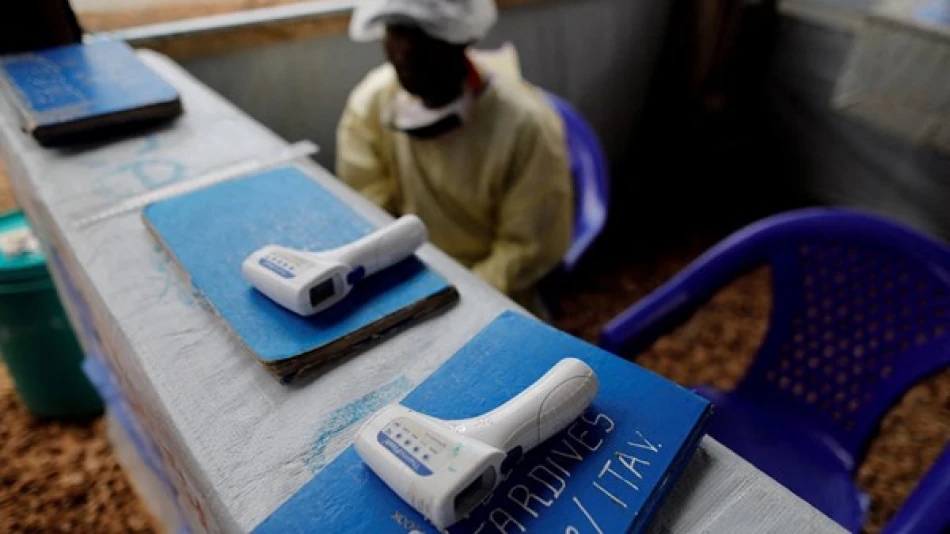
Democratic Republic of Congo Launches Ebola Vaccination Campaign to Curb Outbreak
Congo Races Against Time as WHO Launches Ebola Vaccination Campaign Amid Deadly Outbreak
The World Health Organization has launched an emergency vaccination campaign in the Democratic Republic of Congo's Kasai province, targeting frontline health workers and high-risk populations as the country battles a new Ebola outbreak that has already claimed at least 16 lives. The swift response reflects hard-learned lessons from previous outbreaks that devastated the region when containment efforts arrived too late.
Outbreak Spreads in Resource-Strained Region
The current outbreak, centered in the Bolabaye area of Kasai province in southern DRC, has infected 68 suspected cases since authorities declared the emergency earlier this month. According to the Africa Centers for Disease Control and Prevention, the mortality rate of roughly 24% mirrors the devastating potential of this hemorrhagic fever that can kill up to 90% of those infected without proper medical intervention.
Kasai province, already struggling with limited healthcare infrastructure and ongoing security challenges, represents a particularly vulnerable region for Ebola containment. The area's remote location and sparse medical facilities could allow the virus to spread unchecked if vaccination efforts fail to reach critical mass quickly.
Vaccine Rollout Faces Initial Supply Constraints
The WHO has deployed an initial 400 doses of the Ervebo vaccine, with additional shipments planned in the coming days. While this represents a faster response than previous outbreaks, the limited initial supply highlights the ongoing challenges in maintaining adequate vaccine stockpiles for emergency deployment.
The International Coordinating Group for Vaccine Provision has approved the release of approximately 45,000 additional doses, which will supplement an existing stockpile of 2,000 doses already in the country. This brings the total available vaccines to nearly 50,000 doses – enough to cover immediate high-risk populations but potentially insufficient for a wider outbreak.
Lessons from Past Outbreaks Drive Rapid Response
The current vaccination strategy reflects critical lessons learned from the 2014-2016 West Africa epidemic that killed over 11,000 people and the 2018-2020 outbreak in eastern DRC that claimed 2,299 lives. Both crises demonstrated that early, aggressive vaccination of contacts and healthcare workers can dramatically reduce transmission rates.
The Ervebo vaccine, developed by Merck and approved by multiple regulatory agencies, showed 97.5% efficacy in clinical trials during the West Africa outbreak. Its deployment within weeks rather than months of outbreak declaration represents a significant improvement in global pandemic preparedness.
Regional Implications for Disease Containment
Congo's position as a transportation hub in central Africa makes rapid containment critical for preventing regional spread. The country shares porous borders with nine nations, many with limited surveillance and healthcare capacity. Previous outbreaks have demonstrated how quickly Ebola can cross borders when containment measures prove inadequate.
The economic implications extend beyond immediate healthcare costs. Ebola outbreaks typically trigger trade restrictions, border closures, and reduced investment that can persist long after the health emergency ends. Swift containment through vaccination could prevent the broader economic disruption that has historically followed major outbreaks in the region.
Testing Global Pandemic Preparedness Systems
This outbreak serves as a real-world test of pandemic preparedness improvements implemented since COVID-19 exposed global weaknesses in emergency response. The rapid vaccine deployment and coordinated international support suggest meaningful progress in outbreak response capabilities.
However, the initial supply constraints and the outbreak's emergence in a region with limited healthcare infrastructure underscore persistent vulnerabilities. Success in containing this outbreak will likely influence future investment in vaccine stockpiling and rapid response mechanisms for emerging infectious diseases.
Most Viewed News

 Layla Al Mansoori
Layla Al Mansoori






